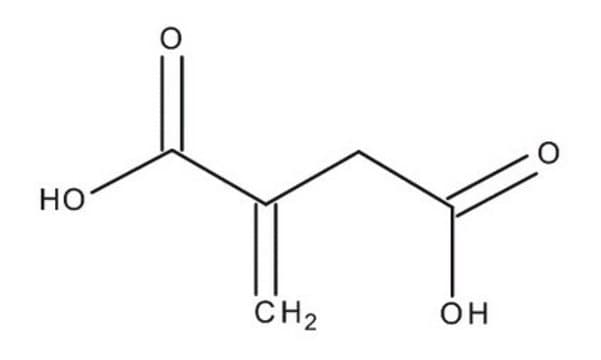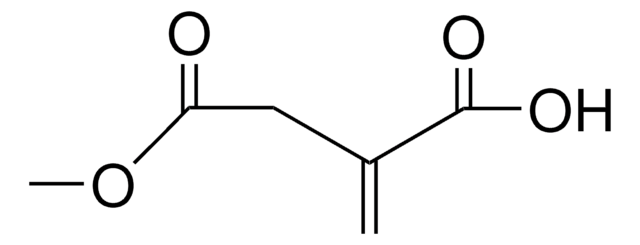I29204
Itaconic acid
≥99%
Synonyme(s) :
Methylenesuccinic acid
About This Item
Produits recommandés
Niveau de qualité
Pureté
≥99%
Température d'inflammation spontanée
1472 °F
Pf
165-168 °C (lit.)
Densité
1.573 g/mL at 25 °C (lit.)
Chaîne SMILES
OC(=O)CC(=C)C(O)=O
InChI
1S/C5H6O4/c1-3(5(8)9)2-4(6)7/h1-2H2,(H,6,7)(H,8,9)
Clé InChI
LVHBHZANLOWSRM-UHFFFAOYSA-N
Vous recherchez des produits similaires ? Visite Guide de comparaison des produits
Application
- As a comonomer in the polymerization of polyacrylonitrile (PAN) to promote the thermo-oxidative stabilization of polymer.
- In combination with acrylamide to form (poly[acrylamide-co-(itaconicacid)]) to synthesize biodegradable superabsorbent polymers.
- To synthesize biobased polyester composite in fabric industry.
Mention d'avertissement
Danger
Mentions de danger
Conseils de prudence
Classification des risques
Eye Dam. 1
Code de la classe de stockage
11 - Combustible Solids
Classe de danger pour l'eau (WGK)
WGK 1
Équipement de protection individuelle
dust mask type N95 (US), Eyeshields, Gloves
Certificats d'analyse (COA)
Recherchez un Certificats d'analyse (COA) en saisissant le numéro de lot du produit. Les numéros de lot figurent sur l'étiquette du produit après les mots "Lot" ou "Batch".
Déjà en possession de ce produit ?
Retrouvez la documentation relative aux produits que vous avez récemment achetés dans la Bibliothèque de documents.
Les clients ont également consulté
Articles
Our strategy is to synthesize mesoporous carbonaceous materials (“Starbons”) using mesoporous expanded starch as the precursor without the need for a templating agent.
Notre équipe de scientifiques dispose d'une expérience dans tous les secteurs de la recherche, notamment en sciences de la vie, science des matériaux, synthèse chimique, chromatographie, analyse et dans de nombreux autres domaines..
Contacter notre Service technique












